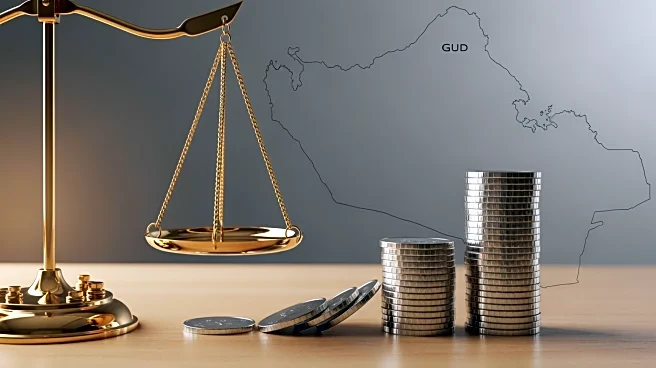What's Happening?
The Federal Reserve's recent monetary policy decisions have led to mixed reactions in major Gulf stock markets. Following the Fed's second interest rate cut this year, Chair Jerome Powell indicated that another reduction in December is not guaranteed.
This statement has caused a shift in investor expectations, with the probability of a December rate cut dropping from over 90% to 65%, according to CME's FedWatch Tool. The uncertainty surrounding U.S. monetary policy has significant implications for Gulf markets, where currencies are largely pegged to the dollar. Saudi Arabia's benchmark index TASI saw a slight increase, buoyed by gains in Saudi National Bank and Saudi Aramco. However, Dubai's main share index experienced a slight decline, influenced by a drop in Emirates NBD shares. Additionally, crude oil prices have fallen due to OPEC+'s decision to pause output hikes, signaling potential oversupply.
Why It's Important?
The Federal Reserve's interest rate decisions are crucial for global financial markets, particularly in regions like the Gulf where economies are closely tied to the U.S. dollar. Changes in U.S. monetary policy can affect currency stability, investment flows, and economic growth in these areas. The reduced likelihood of a December rate cut may lead to increased volatility in Gulf markets, impacting investor confidence and financial planning. Furthermore, the decline in oil prices due to OPEC+'s actions could exacerbate economic challenges in oil-dependent Gulf states, affecting government revenues and economic diversification efforts.
What's Next?
Market participants will closely monitor upcoming Federal Reserve meetings and statements for further clarity on interest rate policies. Any changes in U.S. monetary policy could prompt adjustments in Gulf market strategies and currency valuations. Additionally, OPEC+'s future decisions on oil production will be critical in determining the direction of oil prices, which are vital for Gulf economies. Investors and policymakers in the region will need to navigate these uncertainties to maintain economic stability and growth.
Beyond the Headlines
The interplay between U.S. monetary policy and Gulf economies highlights the broader implications of global financial interdependence. As Gulf states continue to diversify their economies away from oil, the stability of their financial markets becomes increasingly important. The current situation underscores the need for strategic economic planning and risk management to mitigate the impacts of external financial shocks.















